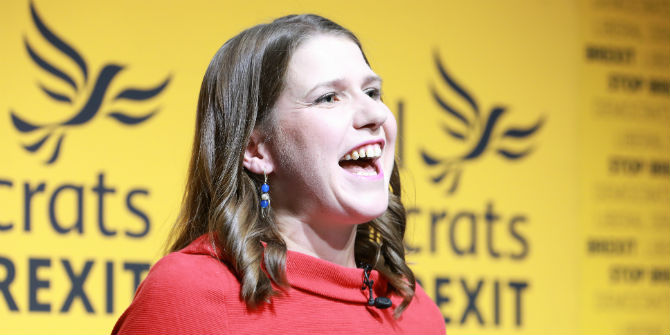 The Lib Dems are right to have promised to revoke Article 50, writes Phil Syrpis (University of Bristol). Revocation would ‘make it stop’ – an appealing proposition for those weary of Brexit and who want to focus on domestic politics. Labour should follow suit.
The Lib Dems are right to have promised to revoke Article 50, writes Phil Syrpis (University of Bristol). Revocation would ‘make it stop’ – an appealing proposition for those weary of Brexit and who want to focus on domestic politics. Labour should follow suit.
It now looks as though the UK will be heading towards a pre-Brexit general election. Notwithstanding the damage which Boris Johnson seems to be inflicting on the Conservative party and on the UK’s creaking constitution, opinion polls indicate that he might well win. If his plan really is to establish a narrative for a pre-Brexit general election, in which he could cast himself as the man of the people, sticking up for the UK in the face of the intransigent EU and the remain establishment (as I argued here in July), it may be that – contrary to appearances – all is going well for him.

The political debate has focused on the timing of the general election (and in particular on the benefits for the opposition of forcing Johnson to break his 31 October ‘do or die’ promise), and on the possibility of electoral pacts and/or understandings between the Conservatives and the Brexit Party, and between the various political groupings opposed to Johnson. This post concentrates instead on the policy pledges, or manifesto commitments, which each of the main parties might make in relation to Brexit. I argue that Labour’s current position plays into Johnson’s hands. As the Liberal Democrats have just proposed to do, moving from support for a people’s vote to support for revoking the Article 50 notification might inject much needed dynamism into the remain campaign.
The positions of the main parties
It is safe to assume that Johnson will campaign to ‘get Brexit done’. He will claim that he is able to get a good Brexit deal from the EU. If that fails, he is prepared to leave with no deal. A notable feature of this plan is that his Brexit will remain stubbornly undefined. He will, much as he has done to date, attempt to portray himself as the candidate who will meet the aspirations of both those who want to leave with a deal, and those who want to leave with no deal.
One part of the opposition strategy will involve shooting down the Johnson campaign. That should not prove unduly difficult. There is very little evidence to suggest that he is close to getting the sort of deal he says he wants. There seem to be no negotiations of substance with the EU. There is no indication that he has understood the difficulties inherent in leaving the single market and customs union, while at the same time avoiding a border either in Ireland or across the Irish Sea. The EU’s negotiating position will not shift just because the UK is serious about no deal. One of the most pervasive myths is that we can leave the EU without a deal on October 31, or whenever the next iconic date happens to be, and that it will then all be over. Of course, it won’t be over. It will just be the start. Our trade and other relationships with the EU and the rest of the world will need to be worked out.
The other, more difficult, part of the opposition strategy involves making an alternative policy pitch to the people. As things stand, Labour’s position is not an irrational one. It is, though, rather difficult to explain to the public. If elected, Labour will negotiate its own ‘better’ Brexit deal. It will then put the resulting deal to the people in a people’s vote. At that stage, it is not clear whether it would back its own deal or remain, although many in the party have already indicated that they are likely to favour the latter.
So were Labour to win power, it would ask the EU for a further extension, and spend a considerable amount of time negotiating with the EU and formulating a referendum question to be put to the people.
The contrast with Johnson’s position could hardly be starker. He will present himself as the man who will get it done, and cast Labour as the party of delay and obfuscation, of ‘yet more Brexit’. He will be on the side of the people. Labour will be said to be trying to manufacture a new referendum to frustrate the will of the people and engineer it to deliver the result they want.
A shift to revoke?
It is easy to see how an electoral campaign based on a long delay and a people’s vote might play into Johnson’s hands. Those who are fed up with Brexit, and who want this all to be over, may be enticed by Johnson’s promise to get it done.
That is why Labour should follow the Lib Dems in campaigning not for a people’s vote, but instead for revocation of the Article 50 notice (as I first argued here in December 2018).
It is a message which, in its urgency and decisiveness, more than matches that of Johnson. He will say that he will get it done. The opposition can say that, within days, Brexit will be over.
Revoke has grassroots appeal. Over six million people signed the revoke petition. Polls suggest that over 50% of the people now support remain. It is almost unthinkable that we might be heading towards a general election which will be dominated by Brexit and that we will not be afforded the option to vote to ‘make it stop’ and enable politics to move beyond Brexit.
Let me try to deal with the arguments against revocation. The first, and most common, criticism is that revocation lacks a democratic mandate. If the case for revoke is made in the context of a general election, in which the various parties campaign on the basis of their preferred Brexit outcomes, that criticism loses its force. A general election affords parties the opportunity to set out what they want to achieve. Just as it is now possible for Johnson and others to argue for no deal (a huge jump from the referendum and the Conservative position in the 2017 general election), it is also possible for opposition parties to argue for revoke.
Second, it is said that only a people’s vote can provide finality, that without a second referendum there will be ‘unfinished business’, and that what started with a referendum can only be ended with a referendum. This strand of criticism overstates what a second referendum can achieve. Let us say that there was a people’s vote, in which either Labour’s ‘better Brexit’ or the Withdrawal Agreement was pitted against remain; and that remain won. Is the contention that Brexiters would accept that Brexit had been settled? Even though their preferred version of Brexit was not on the ballot paper? The reality is that any decision to revoke Article 50, whether or not it is preceded by a people’s vote, would be contested. Revocation would bring the Article 50 process to an end. But there is nothing to stop a future government with a new mandate making a new argument for Brexit. Scottish politics shows us that it is difficult, if not impossible, to put an issue like this to bed for a generation.
If there is a pre-Brexit general election, it will be because there is no majority within the existing Parliament for any of the rival substantive outcomes of the Brexit process (leaving with a deal, leaving with no deal, and not leaving at all). A general election provides an opportunity to elect a new Parliament, in which the arithmetic will likely be different, and in which the policy positions of the various parties may also be different. The stakes could not be higher. It is time for Remainers to have the courage of their convictions. They should use the general election to obtain a mandate for revoking the Article 50 notification.
This post represents the views of the author and not those of the Brexit blog, nor LSE.







METHINKS THE lIB DEMS SHOUYLD RTEMOVE THE WORD DEMOCRATS FROM THEIR TITLE , QED.
There’s one big flaw in your argument: it is close to impossible for the Lib Dems to win an overall majority, hence revoke won’t actually happen. They will be left tarnished with the ‘anti-democrats’ tag but won’t achieve the supposedly intended outcome.
A far better option for the Lib Dems is to back a VoNC in late October or early November, depending on Johnson’s next move, then give support to an interim national govt with a very narrow mandate: agree a deal with EU and organise a confirmatory referendum as soon as possible, deal v remain. The Lib Dems can then claim to have honoured the referendum result by supporting the pursuit of realistic deal, but will still be the most unambiguously pro-European Remain party, with a united Remain position for he forthcoming confirmatory vote. Labour will still be split, as will the Tories.
Tony Blair and others are right: a general election before a confirmatory referendum will solve nothing at all.
Last but not least, if Remain beats the deal in a confirmatory referendum the Brexiters will indeed howl, but your (correct) argument about the majority just wanting closure suggests support for revisiting the whole question again will likely remain limited.
The Lib Dems have played a blinder over the past year but they must not blow it by going all out fit Revoke. Stay cool and play it smart.
If the Liberals were to revoke Article 50 on the basis they had an electoral majority of MPs (but not necessarily a majority of votes), then they would have changed the rules of game. Effectively, every election thereafter would double up as a Brexit referendum. If at any time in the future a Brexit government got a majority of MPs, then by the same rules they could leave the EU without the need for a referendum. This is to nobody’s advantage because the situation is asymmetric. You can ‘not leave’ the EU as many times as you like without restricting the possibility of leaving later, but you only have to leave once and rejoining is a far more difficult.
The inability of the Remainers to implement the decision of the last referendum has already given us a Boris Johnson Government. Please don’t take up the suggestion here so that we get a Farage government further down the line.
@Philip, the Liberals already lost the right to call themselves ‘democrat’ when they refused to vote for the recommendations of the independent Boundary Commission in 2013.
@Teejay: “the Liberals already lost the right to call themselves ‘democrat’ when they refused to vote for the recommendations of the independent Boundary Commission in 2013.” I think they lost it when, like Labour, they broke their 2005 manifesto commitment that what was to become the Treaty of Lisbon should only be ratified after a referendum. Personally I think that if the public had been allowed to decide about Lisbon instead of being told that such decisions should be left to the grown-ups, the EU referendum might have had a different result. A. it would not have been so obvious that the EU is ruled by elites and not by the people. B. the Remain argument that further EU integration could be vetoed by the UK would have carried more weight. Thank you Tony Blair and Ming Campbell.
Genuine question to author: as someone who supports the new revoke article 50 policy, what are your thoughts on how it has been received so far? Are you still confident it is going to be a ‘winning proposition’?
There is nothing democratic about the Lib Dems.
In the US democrats actually won the popular vote and widely considered a victory by Trump to be a similar disaster for the United States.
Yet, hardly any Democrats actually pretended to not accept the result. Trump did not have to wait 3 years to be President. People don’t still say they that the election was not valid as too may stupid, uneducated or racist people voted for Trump and as such the result should not be counted.
Sure people may passionately believe Brexit is bad just like the majority of the UK believe the complete opposite. That’s why we have a voting system so the people can decide.
The conduct of the remainer elite has been a total disgrace. When they day they don’t respect the public vote what they mean is they don’t accept the concept of democracy.
Few can doubt the massive elitist project fear campaign of lies which have been proved wrong time and again. Not since Tony Blair’s “weapons of mass destruction” has the public been lied on this level.
The Lib Dem’s are the most unprincipled, anti-democratic force in the Western World.